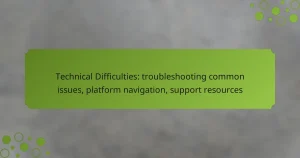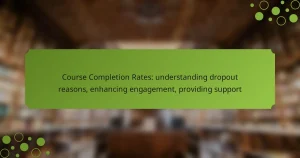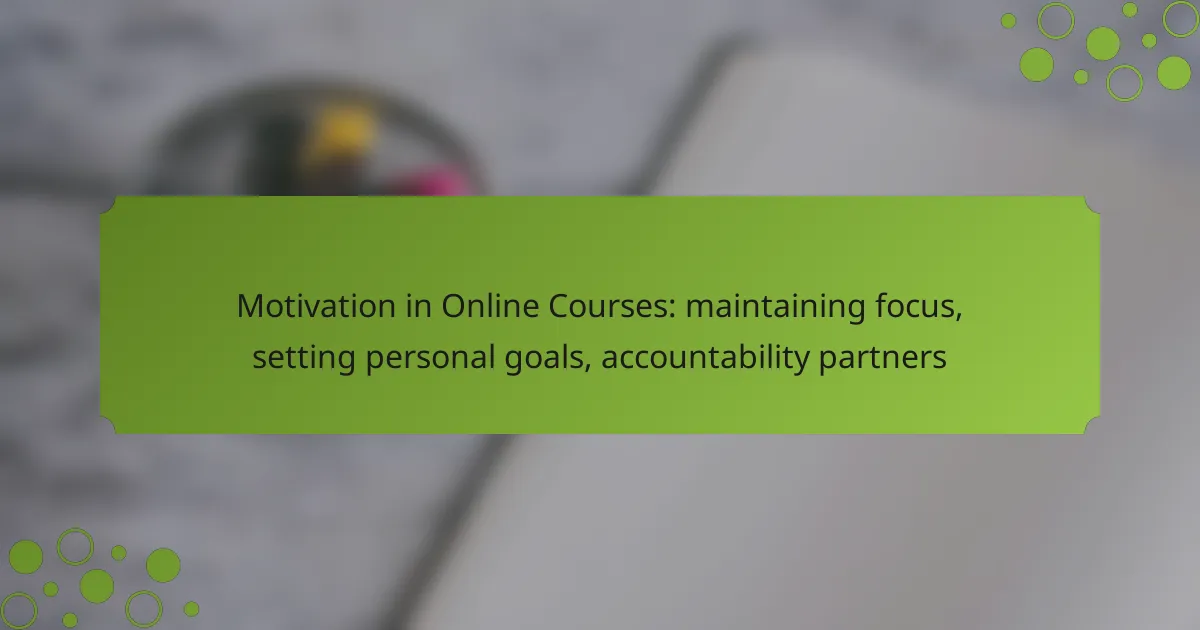
Staying motivated in online courses can be challenging, but with the right strategies, learners can enhance their focus and productivity. By setting specific personal goals and partnering with accountability buddies, individuals can create a supportive environment that fosters commitment and success in their educational journey.
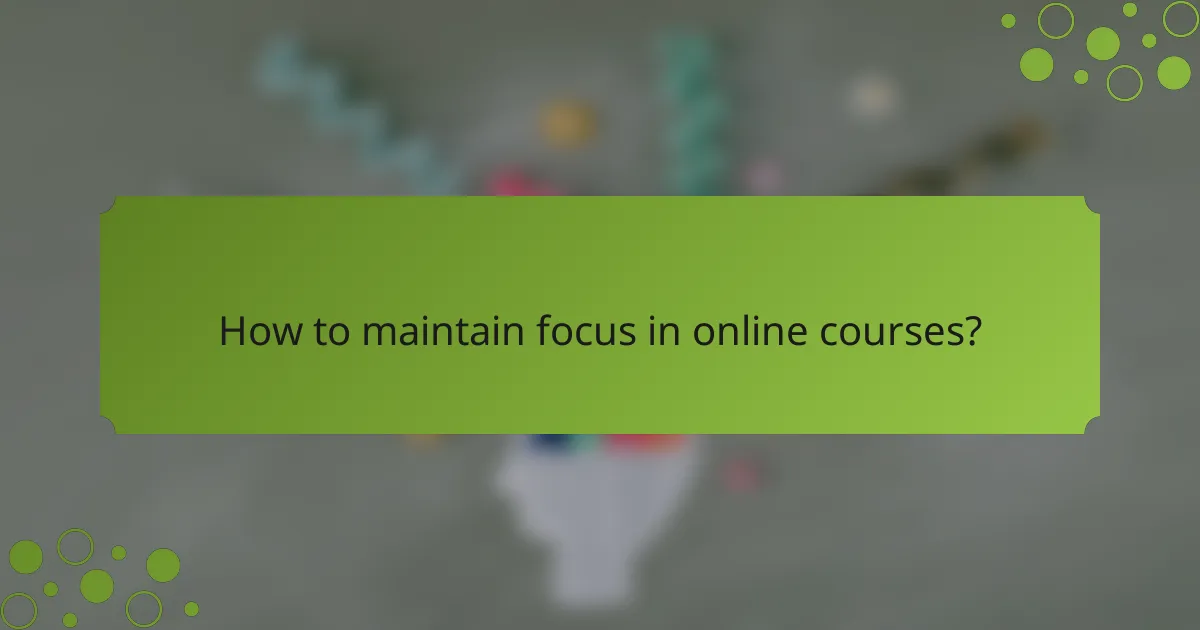
How to maintain focus in online courses?
Maintaining focus in online courses requires effective strategies to manage time, minimize distractions, and create an environment conducive to learning. By implementing specific techniques and tools, learners can enhance their concentration and productivity.
Time management techniques
Effective time management is crucial for staying focused in online courses. Techniques such as the Pomodoro Technique, which involves studying for 25 minutes followed by a 5-minute break, can help maintain concentration. Additionally, setting specific study schedules and deadlines can create a sense of urgency and structure.
Consider using a planner or digital calendar to block out dedicated study times. Aim for consistent study sessions each week, ideally ranging from 1 to 3 hours, depending on your course load and personal commitments.
Minimizing distractions
To maintain focus, it’s essential to minimize distractions in your study environment. Identify common distractions, such as social media notifications or background noise, and take steps to eliminate them. For instance, turning off notifications on your devices can significantly reduce interruptions.
Using apps that block distracting websites during study sessions can also be beneficial. Aim to create a distraction-free zone where you can concentrate fully on your coursework.
Using productivity tools
Productivity tools can enhance focus and organization in online learning. Tools like Trello or Asana can help track assignments and deadlines, while note-taking apps like Evernote or Notion can keep your study materials organized. These tools allow you to visualize your progress and stay on top of your tasks.
Consider using timers or focus apps that encourage you to stay on task for specific periods. Many of these tools offer features that help you set goals and reminders, which can further boost your motivation.
Creating a dedicated study space
A dedicated study space is vital for maintaining focus in online courses. Choose a quiet area free from distractions, equipped with all necessary materials. This space should be used exclusively for studying to create a mental association between the environment and learning.
Ensure your study area is comfortable and well-lit, as this can impact your concentration. Personalizing the space with motivational quotes or images can also enhance your focus and make studying more enjoyable.

What personal goals should you set for online courses?
Setting personal goals for online courses helps maintain motivation and focus. These goals should be specific, measurable, achievable, relevant, and time-bound to ensure they effectively guide your learning journey.
SMART goal framework
The SMART goal framework is a widely used method for setting effective objectives. Each goal should be Specific, Measurable, Achievable, Relevant, and Time-bound. For example, instead of saying “I want to learn programming,” a SMART goal would be “I will complete three programming modules in the next four weeks.” This clarity helps track progress and maintain motivation.
When applying the SMART framework, consider breaking down larger goals into smaller, manageable tasks. This approach can prevent overwhelm and provide a clear path forward. Regularly review and adjust your goals as needed to stay aligned with your learning pace.
Short-term vs long-term goals
Short-term goals are typically achievable within a few weeks or months, while long-term goals may span several months to years. For instance, a short-term goal could be completing a weekly assignment, whereas a long-term goal might involve obtaining a certification by the end of the course.
Balancing both types of goals is crucial for sustained motivation. Short-term goals provide quick wins that boost confidence, while long-term goals offer a broader vision of what you want to achieve. Regularly assess your progress on both fronts to stay engaged and motivated.
Aligning goals with course objectives
Aligning your personal goals with the course objectives ensures that your efforts contribute to your overall learning outcomes. Review the course syllabus to identify key skills and knowledge areas, then tailor your goals to address these elements.
For example, if a course emphasizes practical applications of theory, set a goal to apply learned concepts in real-world scenarios. This alignment not only enhances your learning experience but also increases the likelihood of achieving desired outcomes. Regularly check your progress against course objectives to stay focused and motivated.
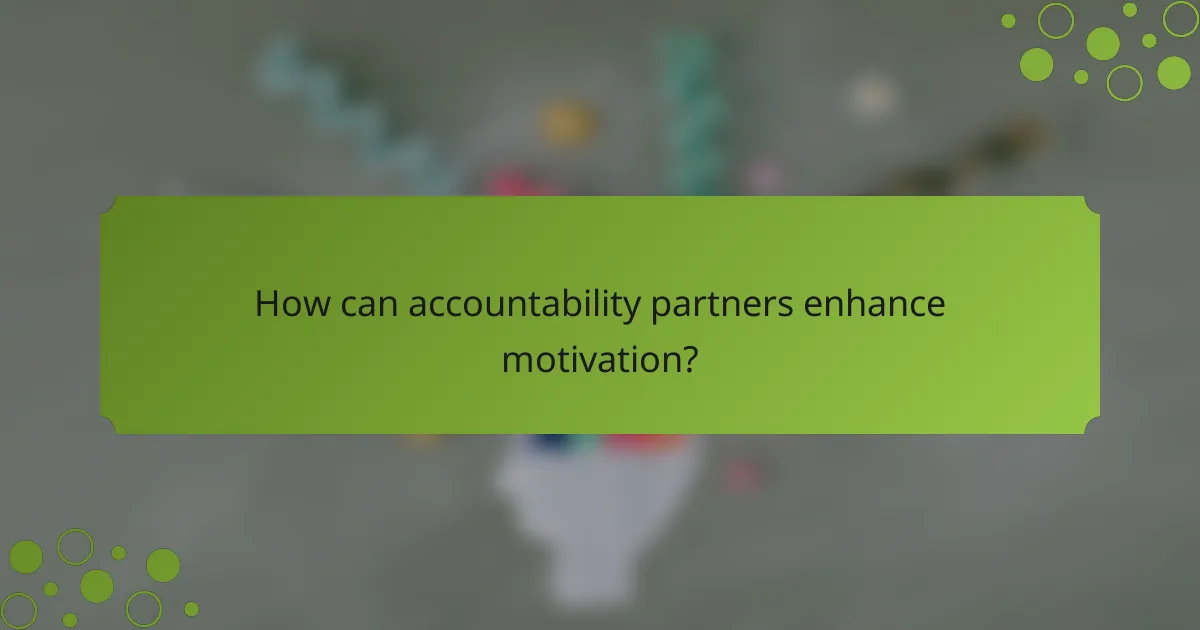
How can accountability partners enhance motivation?
Accountability partners can significantly boost motivation by providing support, encouragement, and a sense of responsibility. When individuals share their goals with a partner, they are more likely to stay committed and focused on their online courses.
Finding the right partner
Choosing an accountability partner who shares similar goals or interests can enhance motivation. Look for someone who is reliable, supportive, and willing to engage regularly. This could be a classmate, a friend, or even someone from an online community.
Consider compatibility in terms of schedule and communication style. A partner who is available for discussions and check-ins at times that suit both parties will be more effective in maintaining motivation.
Setting regular check-ins
Establishing a routine for regular check-ins is crucial for accountability. Aim for weekly or bi-weekly meetings, whether in person or via video calls, to discuss progress and setbacks. This consistency helps keep both partners focused on their goals.
During these check-ins, set specific times to review what has been accomplished and what needs improvement. This structured approach can help identify obstacles and reinforce commitment to the course material.
Sharing progress and challenges
Openly sharing progress and challenges with your accountability partner fosters a supportive environment. Celebrate achievements, no matter how small, to maintain motivation and encourage continued effort.
Discussing challenges can lead to valuable insights and solutions. By collaborating on problem-solving, both partners can learn from each other’s experiences and develop strategies to overcome obstacles in their online courses.

What are the benefits of online courses for motivation?
Online courses offer significant motivational benefits by providing flexibility, diverse resources, and community support. These elements help learners stay engaged and committed to their educational goals.
Flexible learning pace
One of the primary advantages of online courses is the ability to learn at your own pace. This flexibility allows you to allocate time according to your personal schedule, making it easier to balance studies with work or family commitments.
For instance, if you find a particular topic challenging, you can spend extra time on it without the pressure of keeping up with a classroom schedule. Conversely, if you grasp concepts quickly, you can advance through the material faster.
Diverse learning resources
Online courses typically provide a variety of learning resources, including videos, articles, quizzes, and interactive activities. This diversity caters to different learning styles, helping you stay motivated by engaging with the material in multiple ways.
For example, visual learners may benefit from video content, while those who prefer reading can focus on written materials. Access to various formats can enhance understanding and retention, making learning more enjoyable.
Community support and engagement
Engaging with a community of learners can significantly boost motivation in online courses. Many platforms offer discussion forums, study groups, or social media connections, allowing you to share experiences and seek help from peers.
Finding an accountability partner within this community can further enhance your commitment. Regular check-ins with a study buddy can help you stay on track and motivated to complete your courses, reducing feelings of isolation often associated with online learning.

What tools can help track progress in online courses?
Several tools can effectively track progress in online courses, helping learners stay organized and motivated. These tools include learning management systems, goal-tracking apps, and progress journals, each offering unique features to enhance the online learning experience.
Learning management systems
Learning management systems (LMS) are platforms that facilitate the administration, documentation, tracking, and reporting of online courses. They often include features like course calendars, progress tracking dashboards, and completion certificates, which help learners monitor their advancement.
Popular LMS options include Moodle, Canvas, and Blackboard, each providing various tools to visualize progress and engagement. When choosing an LMS, consider factors such as user interface, integration capabilities, and support resources to ensure it meets your learning needs.
Goal-tracking apps
Goal-tracking apps are designed to help users set, monitor, and achieve their educational objectives. These apps often allow users to break down larger goals into smaller, manageable tasks, making it easier to stay focused and motivated.
Examples of effective goal-tracking apps include Todoist, Trello, and Asana. When using these apps, establish clear deadlines and regularly review your progress to maintain accountability and adjust your goals as necessary.
Progress journals
Progress journals are personal records where learners can document their experiences, challenges, and achievements throughout their online courses. This reflective practice not only helps track progress but also encourages deeper engagement with the material.
To maintain an effective progress journal, set aside time weekly to write about what you’ve learned, any obstacles faced, and strategies to overcome them. This practice can enhance self-awareness and motivation, ultimately leading to a more successful online learning experience.

